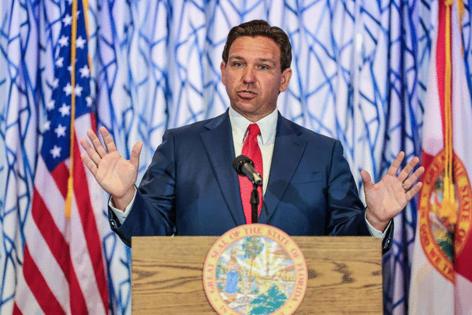A Florida law affecting homelessness kicks in Oct. 1. Here's what will change
Published in News & Features
MIAMI — Local governments across Florida are bracing for Oct. 1, the effective start date of a ban on sleeping in public that could upend how the state deals with homelessness.
Signed into law by Gov. Ron DeSantis in March, House Bill 1365 holds counties and cities legally responsible for enforcing a ban on public camping. If they don’t, residents will be able to sue, starting Jan. 1.
The measure’s supporters argue that it will protect local communities by upholding “law and order.” Opponents contend that it criminalizes homelessness and, without viable housing alternatives, could lead to the arrests of people experiencing homelessness across the state.
But what does the law actually say? Here are some of its key provisions.
Florida’s new rules about public camping
Under the law, Florida counties and cities cannot allow people to camp in public, meaning that people who sleep on public land, be it out in the open or in a tent, could soon face repercussions for doing so. Recreational campers need not fret, assuming they’ve pitched their tents at a designated campground.
The law does not specify penalties. Local governments are tasked with enforcing the ban and dealing with offenders as they see fit, keeping in mind that it is city and county governments that are on the legal hook for violations.
The law does allow people to sleep in their cars, so long as those cars are registered, insured and parked legally.
Where will Florida’s homeless populations go?
The law doesn’t specify what counties and cities should do with their homeless populations.
Local governments get to decide how they want to enforce the law, but a failure to comply with the ban could open them up to lawsuits.
While the law makes no mention of jail time for offenders, municipalities looking to avoid costly court battles could arrest violators — especially if they refuse to go to a shelter — in an effort to keep people off the streets.
The law also says that local governments lacking shelter beds can designate outdoor space where people without housing could sleep. Subject to approval and monitoring by the Department of Children and Families, those encampments could stand for one year before they would need to be removed. They cannot border residential areas or affect the property value, safety and security of residences or businesses.
The law mandates that any encampments have minimum standards of safety and sanitation, including “clean and operable restrooms” and running water. Behavioral health services must be available, and illegal substance and alcohol use is to be prohibited.
None of those minimum standards of health and safety — except for the prohibitions on illegal drugs and alcohol — apply to “fiscally constrained counties,” which currently include Baker, Bradford, Calhoun, Columbia, Desoto, Dixie, Franklin, Gadsden, Gilchrist, Glades, Gulf, Hamilton, Hardee, Hendry, Highlands, Holmes, Jackson, Jefferson, Lafayette, Levy, Liberty, Madison, Okeechobee, Putnam, Suwannee, Taylor, Union, Wakulla and Washington counties. Most of those counties are rural and have smaller homeless populations than larger metro areas in Florida.
Miami-Dade County’s homeless agency, the Homeless Trust, “is not considering a public encampment at this time,” according to a statement it released to the Miami Herald. In a recent memo, the mayor’s office described encampments as “fraught with concerns” that include potentially inadequate standards of dignity and safety, given the disparate households that they might house. It would also be a costly logistical challenge to erect, maintain and deconstruct an encampment in the span of one year, the memo said.
Ron Book, chairman of the Homeless Trust, said he hopes the county can expand its short-term crisis housing capacity to avoid the construction of encampments. Both the recent purchase of a hotel in Cutler Bay, which will house senior citizens currently living in the shelter system, and the proposed acquisition of “tiny homes” could free up badly needed shelter beds.
Who can sue Florida cities and counties about homelessness?
County residents, businesses located in the county and the state attorney general can all take Florida municipalities to court. If the local government doesn’t address a reported violation within five days of receiving a written complaint, county residents and businesses can sue for damages, including the costs involved with going to court, such as lawyer fees.
“There could be some real money involved,” said Stephen Schnably, a law professor at the University of Miami who specializes in homelessness.
It’s not immediately clear what constitutes a “resident” under the new law. Florida has various context-dependent definitions of “resident” — for example, the requirements to be considered a resident for in-state tuition purposes are different than those needed to be considered a resident for tax purposes.
Regardless, eligible plaintiffs likely must have some residential status in a county in order to bring a lawsuit against that local government.
Jurisdictional responsibility — at least in a county like Miami-Dade, which houses a number of independently run cities — is also unclear and likely won’t be known until at least Oct. 1, when enforcement dynamics begin to take shape.
What’s happening when?
While the law takes effect on Oct. 1, residents cannot sue their local governments for noncompliance until Jan. 1.
That means Florida cities and counties won’t be at any legal risk until next year. Still, Schnably noted that some localities will likely begin enforcing the ban come October for fear of infringing on the state law.
The law does not apply during states of emergency, which are often called during weather emergencies.
This story was produced with financial support from supporters including The Green Family Foundation Trust and Ken O’Keefe, in partnership with Journalism Funding Partners. The Miami Herald maintains full editorial control of this work.
©2024 Miami Herald. Visit at miamiherald.com. Distributed by Tribune Content Agency, LLC.







Comments